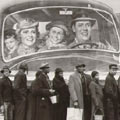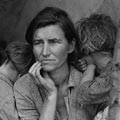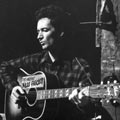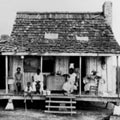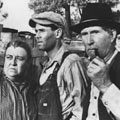Study Plan
Words and Images
| Drama | Prose | Poetry | Films | Photography |
Supplementary Resources
Biographies:
John Steinbeck: Jay Parini
John Ford: Joseph McBride
John Ford and the American West: Peter Cowie
The American West of John Ford (DVD)
Woody Guthrie: This Machine Kills Fascists (DVD)
Music CD's and Song Lyrics
A. The Search for Freedom
| hope | justice | prosperity | identity | escape | fulfilment |
Essential Organising Question 1:
Why do people go "on the road"?
Plot and Settings
- Circumstances, Expectations, Necessity, Adventure
Essential Organising Question 2:
What problems do people encounter "on the road"?
Dialogue and Relationships
- Manner of Speech, Expressions, Emotions
Character Study
- Roles and Types: Searcher, Adventurer, Nomad, Fugitive
Essential Organising Question 3:
What aspirations do they carry "on the road"?
Dramatic and Literary Analysis
- Style and Dramatic Form: Revelations through Dialogue and Description
- Imagery and Sequencing: Rhythm, Flow, Juxtapositions, Symbolism
- Suspense and Contrasts: Safety - Danger, Love - Hate, Wealth - Poverty, Courage - Cowardice
Use of Music and Songs
- The blend of tune and words, dance rhythms, the ballad, protest songs
B. Exploring the Past
- How myths are created through the art forms
- How imagery remains indelibly as our knowledge of the past
Essential Organising Question
How do the artistsí own experiences affect their work?
Biographical Study: The relationship between artists' lives, their ideals and their creativity
C. Research
Essential Organising Question
What was life actually like "on the road" in the pioneering days and during the Great Depression?
Research Topics
- The Dust Bowl Refugees
- The Drought and the Great Dust Storm
- The Great Depression
- The Cowboy Era of Wyatt Earp
- The lives of women in the pioneering days
- Period Fashions
- The lives of Indian tribes
- The Wagon Train Journeys
- The US Military in the 19th century
D. Dramatisation
Essential Organising Question
How do people behave "on the road"?
- Performance of scenes and songs from the written and visual texts
E. Assessment
Assignments
- Writing: Personal, Analytical and Creative Responses
- Research Task - Study of the authors, artists and historical background (Group Powerpoint)
- Analysis - Identify and select examples of literary techniques from texts
- Vocabulary - Meanings, spelling, root words, parts of speech
- Discussion - Exchange of views and oral presentations
- Reading: Reading/Listening to texts
- Rehearsals: Setting up the dramatic presentation
- Songs: Listening/Reading lyrics
- Reading: Individual reading program during library lesson
Summative Tasks
WRITTEN: major essays on each unit : Sample Assignment Sheets
ORAL: research and dramatic presentations
Assessment Criteria
Written Work:
- Comprehension
- Editing
- Accuracy
- Fluency
- Thoughts and Ideas
- Composition
- Presentation
|
|
Oral Expression:
- Clarity
- Accuracy
- Fluency
- Thoughts and Ideas
- Presence
- Cooperation
|
|
